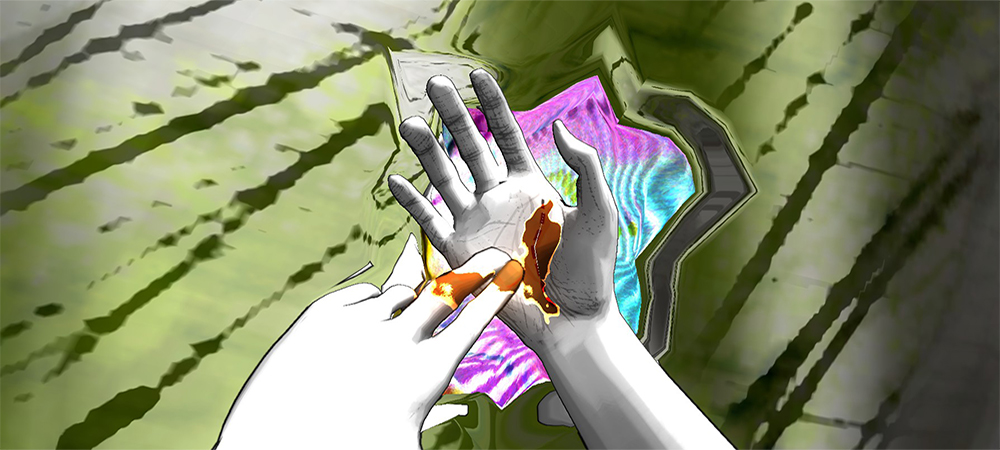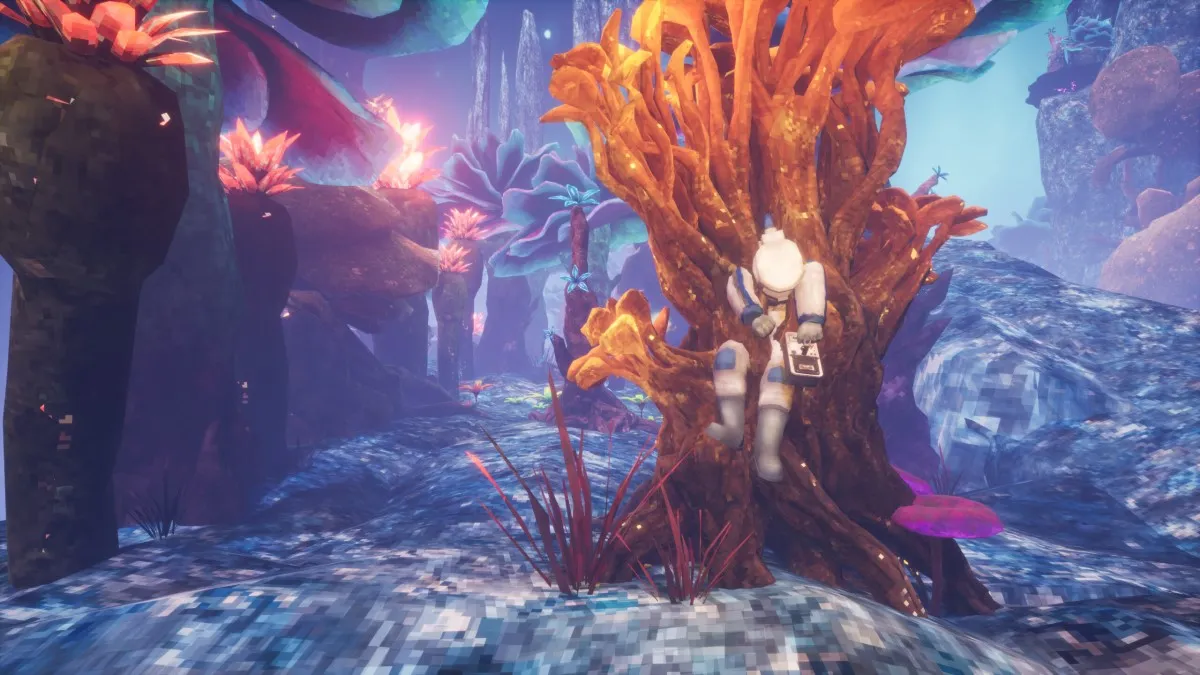The medium is the message
The Magic Circle is a game set inside of a game, where you bend and break the rules to make it another game entirely. This is all in service of makings a meta-contextual statement about the game making industry and the tension between the creator and the audience.
Still with me after that? Then you’re probably The Magic Circle‘s target audience.

The Magic Circle (PC)
Developer: Question
Publisher: Question
MSRP: $19.99
Released: July 9, 2015
The Magic Circle (the aforementioned meta-game inside of this real life title) is Ishmael “Starfather” Gilder’s brainchild. The long awaited sequel to his beloved fantasy game 20 years in the making, mocked as vaporware by detractors and seen as the holy grail by his fans. A monochromatic fantasy world (that was a Doom-like sci-fi game for the first ten years of development) and probably the worst game ever made. Until you come along that is.
Inserted into the game as a nameless play-tester, you see the drama play out in front of you. A world made of patchwork fixes and temporary assets while the developers, represented as giant floating eyes, loom overhead, changing things by whim. If the project wasn’t already doomed by constant redesigns, oversized egos, and feature-creep, things take a surreal turn when something reaches out to you. Something that lives inside the game. Something that seems vaguely sinister, with its own agenda, an axe to grind against “the gods” as he calls the developers.
What is it? A rampant A.I. that’s somehow grown deep inside the mess of code? A machine spirit? You don’t find out its exact nature until fairly deep into the game, and even then there is room for interpretation. What’s important is what it shows you, how to get elbow deep into the guts of the code and rewrite it to your liking. How to use a simple but powerful editor to take the legs off one creature and stick them onto another. How to turn an enemy into a friend into an enemy of your other enemies. How to remake the world to your design.

Then he sets you loose, a poltergeist in the programming, hacking in features, resurrecting cut content. Sometimes you play the part of a technological necromancer, finding content in the limbo of vaporware and dragging it back into the game. More often, you’re Dr. Frankenstein, ripping bits and pieces off of creatures and stitching them back together to make your own beautiful little monster babies. The result has a pleasing effect, satellite dishes and broken bits of star ships poking out of the cliched castle walls of Ishmeal’s would-be opus, an army of weaponized mushroom men following at your heel.
Once the tutorials are over and the rather unorthodox premise established, the middle chunk of the game opens up into a sandbox that has you solving puzzles and indirectly slaying monsters by breaking all the rules. The flexibility of the editor, what you can do with a few swapped abilities here, a slight behavioral shift there, is astounding. Many of the puzzles (such as they are) can be solved in so many ways that I was almost always unsure if I did it the “right” way, or if I just bent and broke things until the pieces all fell where I hoped they would. I love that feeling, it’s beautiful when games that are confident enough in themselves to not only let that happen, but applaud the player for doing so.
There is a light tone to the whole affair. The various developers are chatty, with some great performances turned in from James Urbaniak (better known as Dr. Venture from the Venture Bros.), Ashley Burch, and others. There are audio diaries to discover, developer commentaries from a defunct version of the game to collect, and change logs detailing the carnage of the development process scattered around, all of which reveal not only what a comedy of errors The Magic Circle has become, but also the various neurosis and flaws of the team members.

The comedic tone of the writing and performances feed right back into the gameplay. Silly decisions abound, like the developers (the real ones) always went with the fun idea rather than the easy or clear one. For example, there is no upper limit on how many creatures you can have following around you at once, so things can, and likely will, easily devolve into chaos as you walk around with a fire-spewing zoo trailing behind you. Similarly, there are no limits on how you can swap abilities so it’s easy to make truly ridiculous creatures, like a flying demon puppy with a railgun mouth.
But aside from the obvious circus-show of zaniness, there are tons of small jokes and clever winks. Little details like picking up copies of your own avatar to increase your health (represented by placeholder art that looks like a cylinder with arms). Being able to re-name every creature you hack so you can make your own fun. At one point I ended up changing the name of the game to “Duke Nukem Presents The Magic Circle” and I giggled at my handiwork off and on for the rest of the night.
It’s just fun to tinker around in. The objectives of the game are purposely vague — you need to wrest control of the title away from its current creators, how you’re supposed to accomplish that as a disembodied phantom inside the game isn’t clearly laid out – but they don’t have to be. Exploring the half-built world of The Magic Circle, this pitiful thing, marked with the visible scars of development notes, vestigial remains of deleted content still clinging to it, concept art hastily plastered over the seams, is the meat of the experience. One you wouldn’t want to rush through even if you knew exactly what you were supposed to do. And one, that even with a healthy amount of goofing around and experimentation, is over too soon. The sandbox is tiny, and once the game enters its final chapters there is no coming back to it.

While The Magic Circle has a compelling third act and some neat surprises to throw at the player (sometimes with the intent of harm), it’s hard not to feel like the game is a little thin on the whole. While the central conceit is fun, you don’t spend as much time playing with it as you’d hope. The runtime is already short, and a good chunk of it is taken up with monologues that occasionally veer into full on lectures as well as multiple epilogues. For a game that is about grand ideas betrayed by shaky execution, it’s tempting to explain the lack of substantive content as more sneaky meta-commentary, but while the idea makes me smirk, I don’t think it’s good enough to give the game a free-pass.
But The Magic Circle isn’t just about the gameplay, it has a message. A whole lot to say about what it’s like to make games in the modern video game industry. The stresses it places on people, the incorrect assumptions creators have about their work, and the untamed expectations of a judgmental audience.

Despite being a commentary on the industry, The Magic Circle isn’t gauche enough to single out a specific target. Ishmeal is a composite of several flawed, egotistical developers who are big on hype, hazy on details, and always ready to blame someone else for their shortcomings. There are shades of Molyneux in the mix, flickers of Cage, a sprinkling of Garriot, and a heady musk of Romero to round it out.
Coda, an ardent fan of Ishmeal’s former works who worms her way onto the team, represents the new era of the participant fan; The streamer, the wiki editor, the super-secret pre-beta fan tester, and all the good and ill that’s come along with that shift. Her passion and reverence for the virtual worlds she’s dedicated her life to is engaging and even a little familiar — we’re all enthusiasts around here. But, her obsessiveness and the sheer gall of her skewed priorities quickly become unsettling. Beneath all the fan-girl glee is a shrewd, nasty sense of undeserved entitlement and ownership, the sort of overly-invested fan that will send shamelessly ego-stroking love letters to a developer one day and thinly veiled death threats the next.
Less well defined is Evelyn Maze, a former eSports celebrity who is unwillingly tied to Ishmeal’s sinking boat through contractual chains (a clumsy way of explaining her combativeness while dodging the question of “why doesn’t she just quit?”). She represents the “games are for playing” kind of gamer who has no patience for cut-scenes and a thirst for competition. A philosophy which directly collides with the “Starfather’s” vision of a story-heavy RPG yarn with no combat. As Maze is the unofficial second-in-command of the studio’s disorganized hierarchy (that seems to work like a hippie-commune as run by Joseph Stalin) her and Ishmeal’s constant bickering results in a lot of flushed efforts and confusion on the part of the team, right in line with some of the horror stories we’ve heard about the industry the real world.
And somewhere in there is you, simultaneously gawking at the car crash while pouring more gasoline on it. Are you just another player in this world? A different sort of creator? Are you sabotaging this whole thing, or just giving it the sharp kick it needs?

The problem with talking about a game that aims to surprise is it’s hard to get specific without ruining the experience. But I guarantee, in the near future a lot of ink is going to be spilled about The Magic Circle. The final third of the game goes to some weird places that demand to be dissected.
The message is a little muddled, with so many accusing fingers thrust in so many directions that I’m sure different people will come to radically different conclusions of what it all means. But it’s a message worth hearing, and a world worth exploring, if you care about video games and the people that make them.
[This review is based on a retail build of the game provided by the publisher.]





Published: Jul 20, 2015 12:00 pm